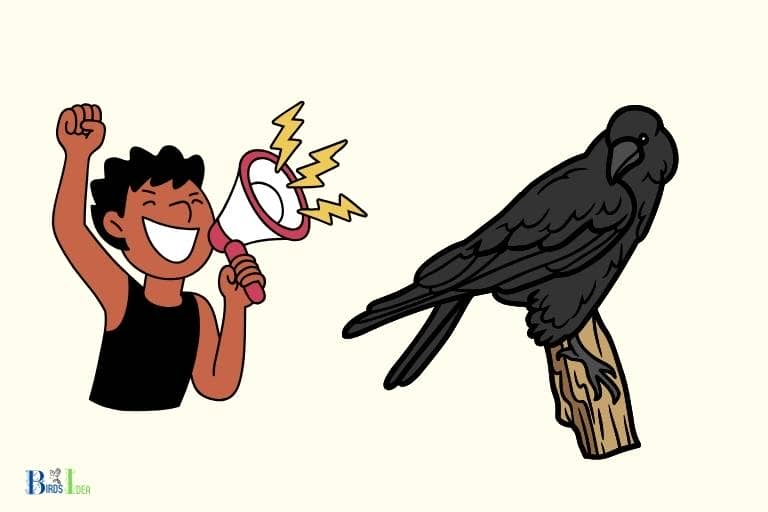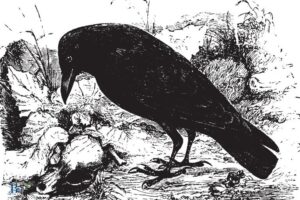What Sound Scares Crows Away? Distress!
The sound that scares crows away is the distress call made by other crows or certain predatory bird calls.
Crows are highly intelligent birds that are known to communicate with each other using various vocalizations.
The distress call of a crow in danger or the call of a predatory bird, such as a hawk or owl, can evoke fear and a sense of threat among crows.
These sounds can effectively scare crows away, deterring them from entering a specific area.
Distress calls and predatory bird sounds can be used as an effective method of keeping crows away from gardens, farms, or other areas where their presence is unwanted.
5 Sound Methods to Scare Crows Away
| Sound Method | Description | Effectiveness |
| Ultrasonic Devices | Devices that emit ultrasonic frequencies to deter crows and other birds | Moderate |
| Bird Repellent Sound Devices | Devices that play predator and distress calls of crows and other birds | High |
| Loud Noises (e.g., Bangs, Whistles) | Unexpected loud sounds such as fireworks, air horns, or whistles | Moderate to High |
| Electronic Pest Repellers | Devices that use a variety of sounds and frequencies to scare away crows | Moderate |
| Predator Sounds (e.g., Hawks, Owls) | Playing recorded sounds of common crow predators | High |
| Human Shouts and Clapping | Yelling, clapping, or other loud human-made sounds | Low to Moderate |
| Wind Chimes or Bells | Hanging wind chimes, bells or other noise-makers in the area | Low to Moderate |
Key Takeaway

Five Facts About: Sounds that Deter Crows
How Sound Disrupts Crow Behavior And Disperses Crow Colonies?
Crow Behavior Patterns And Social Structures
Crows are highly social creatures that frequently assemble in large groups, creating colonies in urban areas or farmland.
Living in these groups allows crows to protect each other from predators and to cooperate in obtaining food.
As such, they are considered a nuisance to many people as they can cause significant damage to crops and gardens. Additionally, their cackling and raucous cries can be incredibly annoying.
The Effects Of Loud Noises And Disturbing Sounds On Crow Behavior
Research has shown that crows are particularly sensitive to loud, sudden noises. Many bird control experts use this to their advantage and utilize various audio devices, including speakers and alarms.
Proven Cases Of Sound Being Used To Repel Crows In Agriculture And Urban Environments
Farmers and gardeners have long struggled to repel crows from their crops. In response, some have turned to sound-based devices that emit disturbing tones. One such example is the use of propane cannons.
These devices create a loud bang that can be heard for miles, effectively disrupting crow feeding patterns and deterring them from the area entirely.
On the other hand, in urban areas, crow infestations are becoming more and more prevalent.
Noise pollution is a significant issue within larger cities, and the sound produced by crows only exacerbates the issue.
As such, city councils have implemented sound-based bird control measures such as ultrasonic emitters, which emit sounds that are distressing to crows.
Application Of Sound-Based Control Of Crow Infestations
The use of sound to control crow populations is becoming increasingly popular thanks to its non-lethal, eco-friendly approach.
Many farmers, gardeners, and urban dwellers prefer this method compared to bird spikes or poisons.
The primary advantage of using sound to control crow infestations is that it is humane, offering a safe solution for all parties involved.
By effectively disrupting crow behavior patterns, property owners can prevent or resolve crow-related problems without causing serious harm to the birds.
Common Sounds That Scare Away Crows
Overview Of Sounds Commonly Used To Scare Crows
There are many sounds that can be used to scare away crows, but some are more effective than others.
Commonly used sounds include:
- Distress calls of other birds
- Predator calls, such as a hawk or owl
- Gunshots or other explosive noises
- Ultrasonic devices
- Noise-making objects, such as pie plates or wind chimes
Explanation Of Why Specific Sounds Work And Others Don’T
Crows are intelligent birds and can quickly learn to ignore certain sounds that are not a threat to them.
However, distress calls of other birds and predator calls are effective because they signal danger to crows, prompting them to fly away.
Gunshots and other explosive noises are also effective because they startle crows and disrupt their feeding or mating activities.
Ultrasonic devices and noise-making objects may work initially, but crows can become habituated to them and ignore them over time.
Natural And Artificial Sounds And Their Effectiveness In Repelling Crows
Natural sounds such as predator calls and bird distress calls are effective in repelling crows because they are part of the crows’ natural environment and are interpreted as real threats.
In contrast, artificial sounds such as ultrasonic devices and noise-making objects may work initially, but crows can become accustomed to them and ignore them.
It is important to use sounds that are natural to crows’ environment if you want to scare them away.
How To Determine Which Sound Is Best For Specific Crow Infestations?
The best sound to deter crows will depend on the specific crow infestation. For example, if crows are nesting on a property, predator calls that mimic the sound of their natural predators may be most effective.
It is important to observe the crows’ behavior and determine what activity you want to disrupt before choosing the appropriate sound.
Tips And Tricks For Maximizing Effectiveness Of Sound-Based Control
To maximize the effectiveness of sound-based control, it is important to:
- Vary the sounds used to prevent crows from becoming habituated to the same noise.
- Use natural sounds when possible, as they are more effective in the long term.
- Combine sound-based control with other methods, such as visual deterrents or habitat modification.
- Place sound devices in areas where crows are most active, such as nesting or feeding areas.
- Use sound-based control consistently over a period of time, as it may take several days or weeks for crows to respond.
Implementing Methods For Using Sound To Keep Crows Away
Implementing the right methods can difficult, but using sound to scare crows is a popular and effective strategy.
Here are some key considerations:
Building Physical Barriers To Protect Crops And Livestock
Sometimes, the best course of action is to physically protect your valuable assets.
Here’s what you need to know about building barriers:
- Construct wire and net fencing: Crows are large enough to hop over shorter fences, making taller options necessary.
- Set up scarecrows: The best defense is still a good offense, and a well-placed scarecrow can successfully deter crows.
- Use bird netting: This is an excellent option if you are looking for an impermeable barrier that doesn’t require constant maintenance.
The Use Of Bird-Scaring Devices And Other Products
There are many sound-based bird-scaring devices on the market. Still, it’s essential to choose the right product and be strategic in using it.
Here are some options to consider:
- Scarers: Emitting a loud, high-pitch noise can be effective in scaring crows away, but they come in different forms such as electronic and gas-powered.
- Lasers: These devices cause disorientation in crows, scaring them away without emitting any noise.
- Specialized cds: These recordings broadcast distress calls or bird of prey sounds, making crows believe that predators are nearby.
Choosing The Right Equipment And Technology For Your Specific Situation
Different equipment and technologies are suitable for different environments and situations.
Here’s what to keep in mind when selecting the right sound technology:
- Consider the size of your property: Smaller areas are best suited for devices that emit high-frequency, low-intensity sounds or low-frequency sounds. In larger areas, you may require specialized equipment, including broadcast or multi-speaker systems.
- Assess the bird types: You may need to adjust your strategy if you are dealing with other bird species besides crows. In some cases, you may need to install equipment that emits combined distress calls for different types of birds.
Balancing The Use Of Sound With Other Crow-Control Methods
Effective crow control often involves a combination of methods. While using sound is essential, it’s vital to balance it with other tactics to ensure long-term success.
Here are some key considerations when balancing sound with other methods:
- Use visual cues: Combining visual cues and sound is highly effective in scaring crows away. This might include the use of scarecrows, streamers, or reflective surfaces.
- Maintain vigilance: Over time, crows can become accustomed to even the most well-designed scare tactics. It’s up to you to switch things up regularly and remain ever-vigilant to ensure their effectiveness.
Balancing Effective Crow Control With Environmental Responsibility
The Importance Of Preserving Ecosystem Balance While Controlling Crow Infestations
While it’s important to prevent crop damage and the spread of disease, it’s crucial to find a balance between effective crow control and environmental responsibility.
Here are some ways to do so:
- Before resorting to drastic measures like using sound or chemical control, consider non-lethal alternatives such as exclusion netting, decoys, or visual deterrents.
- Always consider the long-term impact on the ecosystem when choosing a method of crow control. Killing large numbers of crows can have unintended consequences, throwing off the natural balance of the environment.
- Work with a pest control professional who understands the potential consequences of different control options and can recommend appropriate methods based on the situation.
Potential Negative Side Effects Of Using Sound For Crow Control
Sound is a popular method for deterring crows, but it can have some negative side effects.
Here are a few to consider:
- Sound can be disruptive to other wildlife, including songbirds, bats, and predators like owls and hawks.
- Sound can also be disruptive to humans, particularly in suburban and urban areas where the noise can carry for long distances.
- Overuse of sound can desensitize crows, rendering the method less effective over time.
When considering sound as a method of crow control, it’s important to weigh these negative side effects against the potential benefits.
Balancing The Need To Prevent Crop Damage With The Need To Avoid Harming Other Animals Or The Environment
Preventing crop damage is a top priority for many farmers, but it’s important to balance this need with the need to avoid harming other animals or negatively impacting the environment.
Here are some tips for finding this balance:
- Consider using exclusion netting or physical barriers to protect crops without resorting to lethal methods.
- Use non-lethal decoys or visual deterrents to scare crows away from crops without harming them.
- If sound is the only effective option, use it judiciously and consider the potential impact on other wildlife and humans.
Innovative Ways To Control Crow Populations While Sparing The Environment
Innovative methods of crow control are emerging all the time.
Here are a few worth considering:
- Using drones equipped with speakers to fly over fields and emit crow distress calls.
- Installing artificial nests to reduce crow density.
- Training falcons or other birds of prey to hunt crows.
By exploring new and innovative methods of crow control, we can continue to protect our crops and property without adversely impacting the environment.
FAQ Of What Sound Scares Crows Away
What Kind Of Sound Scares Crows Away?
Do Crows Get Used To Deterrent Sounds?
Can I Use Music To Scare Crows Away?
How Can I Make Homemade Crow Deterrent Sounds?
Are There Other Ways To Scare Crows Away?
Conclusion
Overall, scare tactics such as loud noises can be effective in deterring crows from invading your space.
However, it’s important to note that the best way to keep crows away is to make your property an unattractive habitat for them.
This can be achieved through the use of physical barriers, removing sources of food and water, and regularly maintaining the area.
If you do choose to use sound as a means of scaring crows away, it’s essential to switch up the sounds regularly and avoid becoming too predictable.
Using a combination of deterrents and making your space less inviting for crows will go a long way in keeping them at bay.
By taking the right steps, you can enjoy a crow-free environment while also ensuring their safety and well-being.






